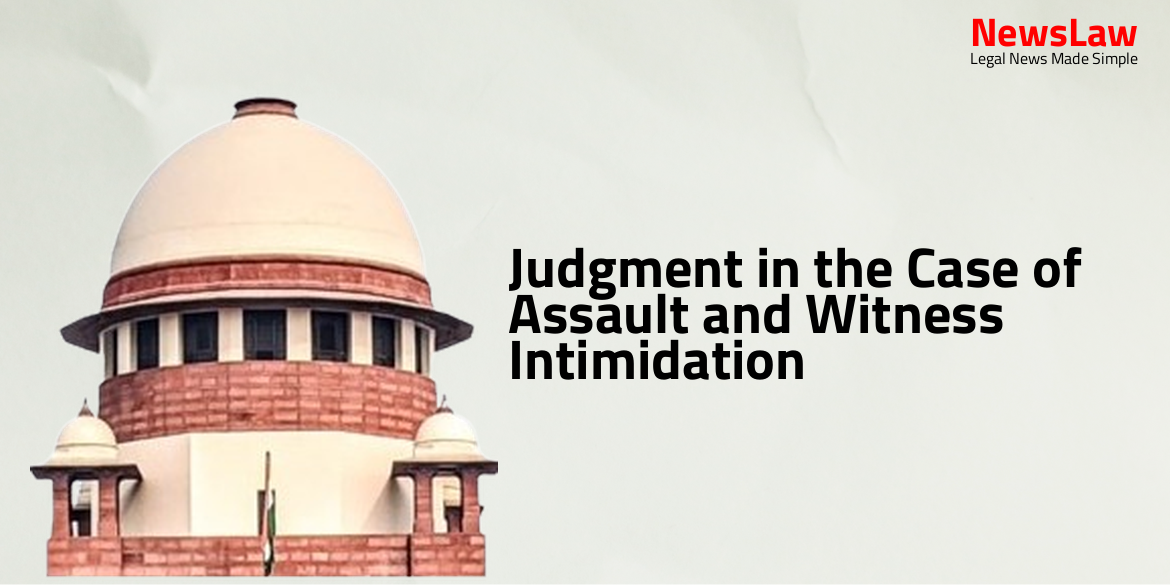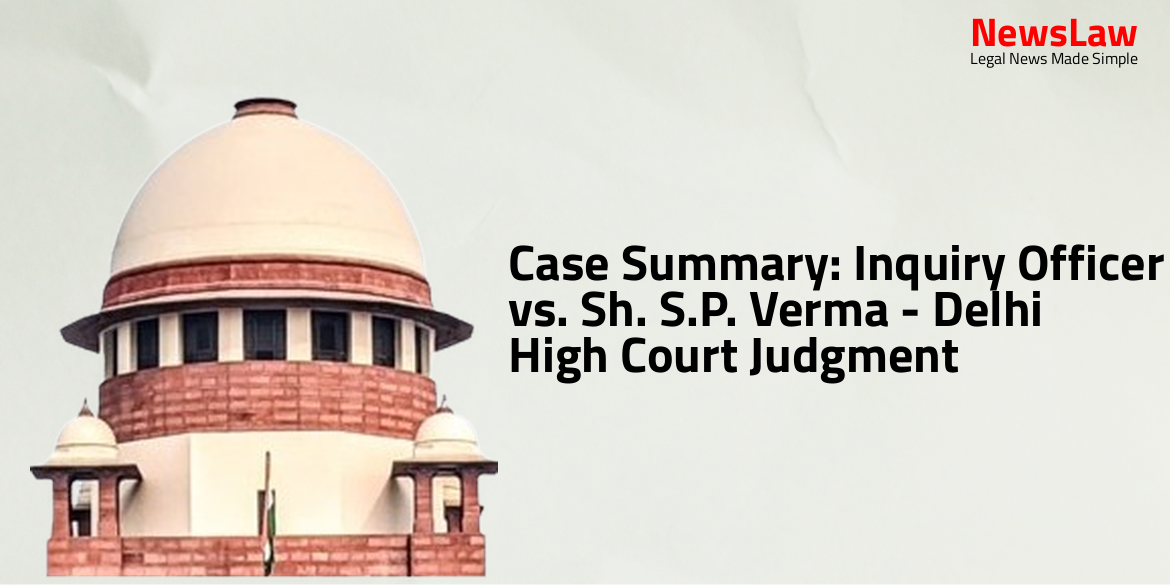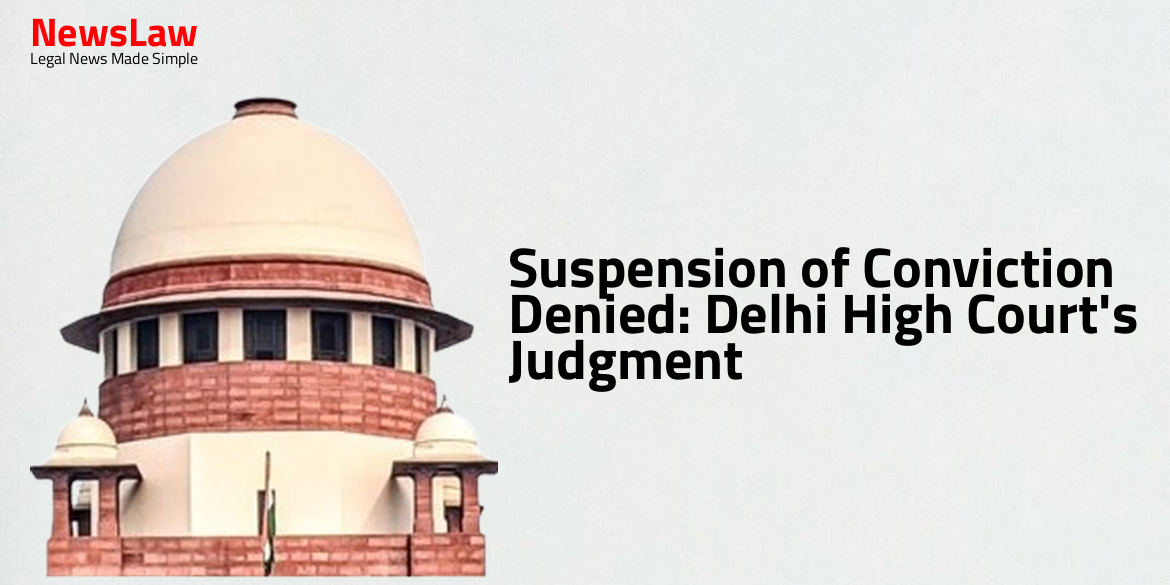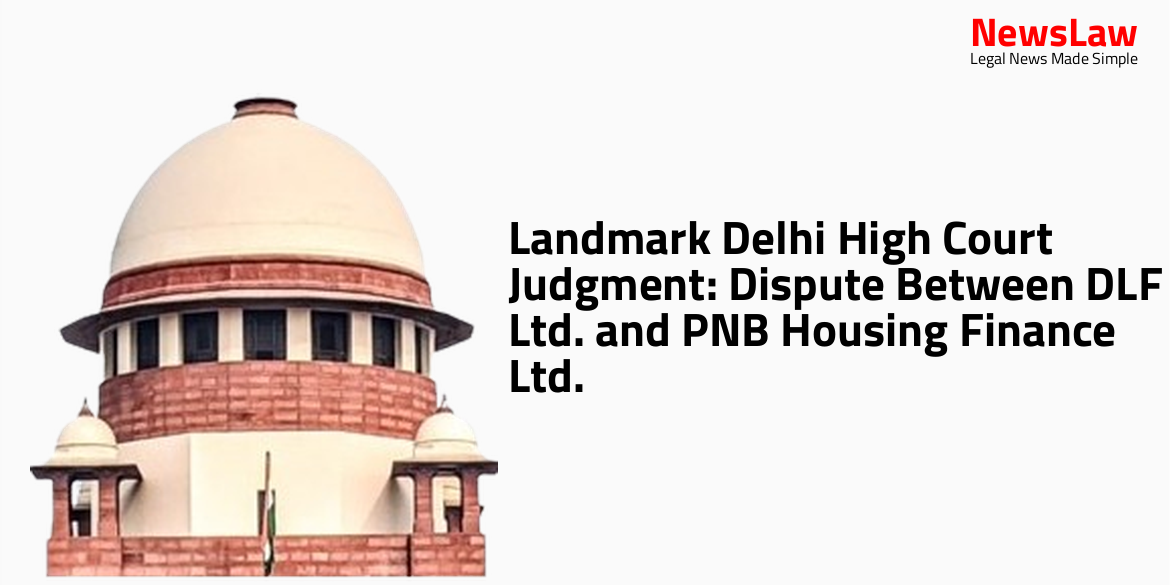A landmark judgment was passed by the Delhi High Court in a case concerning assault and witness intimidation. The judgment addresses the grave nature of the offence committed by the accused in causing the death of a witness in a case of brutal rape. Legal experts are analyzing the implications of this ruling on the criminal justice system. Stay informed on the latest legal developments with #DelhiHighCourt #LegalJudgment #AssaultCase #WitnessIntimidation.
Facts
- Appellant convicted and sentenced for various sections of IPC.
- Different sentences include rigorous imprisonment, fines, and further imprisonment in case of non-payment of fine.
- Cases stem from FIRs registered at Police Station Makhi, Unnao, Uttar Pradesh.
- Adjudicated by the learned District and Sessions Judge (West) at Tis Hazari Courts, Delhi.
- Appeal and application for suspension of sentence filed in relation to Sessions Case Nos. 446/2019 and 449/2019.
- Application under Section 389(1) of Cr.P.C. seeking suspension of sentence during the appeal process.
Arguments
- The appellant has been in jail since 13.04.2018, with a brief period of interim suspension of sentence for his daughter’s marriage.
- The prosecution relies on circumstantial evidence, with the only link being a phone call to the Superintendent of Police.
- The testimonies of several witnesses were uncorroborated and had material improvements overlooked by the Trial Court.
- There is insufficient evidence to establish a direct link between the appellant’s alleged assault and the subsequent death of the victim.
- The appellant has already served almost 6 years of his 10-year sentence.
- The SPP has highlighted the observations made in the impugned judgment regarding the grave and serious nature of the offence committed by the present appellant.
- The appellant’s conviction in this case pertains to causing the death of a witness in a case of brutal rape.
- The appellant has not paid the fine imposed by the Trial Court.
- The appellant is convicted in a connected FIR for the offence of rape, and the murdered witness was a witness in this case as well.
Analysis
- The appellant has already served about 6 out of the 10 years of imprisonment imposed on him.
- The period served is just one of the factors considered for suspension of sentence.
- Other factors include gravity of offense, nature of the crime, criminal antecedents, and impact on public confidence in the court.
- Suspension of sentence means to defer or postpone the execution of the sentence.
- The presumption of innocence is removed once the accused is found guilty.
- The court heard arguments from appellant’s counsel and the CBI, and reviewed the evidence.
- There is a distinct difference between the pre-conviction and post-conviction stages regarding bail applications as per CrPC sections 437, 438, 439, and 389(1).
- The appellant falls under the ambit of the first proviso to Section 389(1) of CrPC due to the ten-year sentence.
- Postponement of sentence is not achieved by keeping the convict in jail; hence, release on bail may be granted.
- The underlying principle is the presumption of innocence until proven guilty by a competent court.
- The appellant will have the opportunity to present all arguments during the appeal hearing.
- Acquittal further strengthens the presumption of innocence.
- Law on the issue of suspension of sentence during appeal is briefly discussed.
- Non-filing of objection by the Public Prosecutor is noted and specified in the case.
- The Appellate Court must give the Public Prosecutor an opportunity to show cause in writing against releasing a convicted person on bail for offences punishable by death, life imprisonment, or imprisonment for at least ten years.
- The Public Prosecutor can file an application for bail cancellation if a convicted person is released on bail.
- The High Court can exercise the power of the Appellate Court for an appeal by a convicted person in lower courts.
- If a convicted person intends to appeal and meets certain criteria, the Court can release him on bail for a specific period until the appeal is filed and the Appellate Court orders.
- The time during which an appellant is released on bail is excluded when calculating the final sentence.
- The minor daughter of the victim was enticed and raped by the appellant Kuldeep Singh Sengar.
- The victim’s father was brutally assaulted by the accused persons in broad daylight and subsequently arrested on false charges, leading to his death in police custody.
- Trials of cases related to these incidents were transferred to Delhi for speedy conclusion.
- The impugned judgment highlighted the role of the appellant Kuldeep Singh Sengar in orchestrating the assault on the victim’s father.
- The appellant’s frustration over negative publicity led to him providing support and encouragement to the other accused persons.
- The call records between the appellant and the co-accused indicated his involvement in the incident and the false implication of the victim in a separate case.
- The trial court’s detailed review of the evidence did not support the argument of discrepancies and loopholes in the prosecution’s case.
- The presumption of innocence is erased once the accused is held guilty, and the court must consider the gravity of the offense in deciding on the suspension of sentence.
- The appellant has prior convictions under the Protection of Children from Sexual Offences Act and IPC for rape of a minor girl.
- Co-accused persons sought time to address arguments on merits on the last date of hearing.
- The court follows principles established by the Supreme Court and declines to suspend the sentence at this stage.
Decision
- The judgment does not express any opinion on the merits of the case.
- The judgment is to be uploaded on the website immediately.
- The appeals are scheduled for hearing on 07.08.2024.
- The duration of the hearing will depend on the arguments presented by the counsels.
- The present application has been dismissed.
Case Title: KULDEEP SINGH SENGER Vs. CENTRAL BUREAU OF INVESTIGATION (2024:DHC:4732)
Case Number: CRL.A.-539/2020



